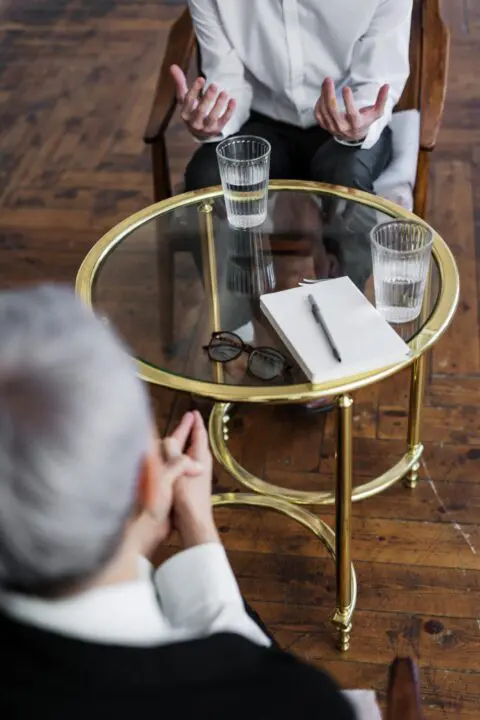What you’ll learn
This guide explores how therapy supports addiction recovery by addressing both emotional and physical healing. You’ll learn how different therapy types work, why combining counseling with medications like Suboxone® (MAT) is so effective, and how to get started with virtual care through QuickMD.
Addiction touches every part of your life. Not just your body, but your thoughts, emotions, relationships, and sense of self. That’s why therapy for substance use isn’t a side note in recovery but often a central part of how people rebuild their lives.
Therapy helps you do the emotional work of recovery, from learning how to manage cravings to healing the pain behind opioid use. It won’t always be easy, but with the right support, it can help you feel more grounded, more hopeful, and more in control.
We’ve seen this firsthand. Our team has helped thousands of people through this process, and we understand just how important it is to care for both your mind and body. The licensed counselors you’ll meet through QuickMD aren’t just trained in therapy; they know how to show up with real compassion.
We also believe therapy should be easy to access. No long waits. No wondering where to turn and certainly no judgment. That’s why we offer same-day virtual counseling sessions where you can connect with a licensed counselor from home, confidentially, affordably, and without waiting weeks for an appointment.
In this guide, we break down how therapy supports recovery from substance use disorder, why it matters for both mental and physical health, and how to get started with care that fits your life. Let’s look at what therapy can really do in addiction recovery and how it might help you.
Why mental health therapy for addiction recovery matters
When people think about treating addiction, medication often comes to mind first. And there’s good reason for that. Medications like Suboxone® can truly save lives by managing opioid withdrawal and reducing cravings.
But recovery runs much deeper than just stabilizing your body. The healing process needs to touch your mind and emotions, too.
Therapy for substance use disorders, whether opioids, alcohol, or both, helps you examine what led to substance use and gives you tools to change those patterns.
Here’s why therapy makes such a difference:
- Addiction often has emotional roots. Trauma, anxiety, depression, grief. These don’t go away just because the substance does. Therapy gives you tools to work through what’s underneath.
- Recovery is about rewiring your brain. Substances like opioids impact how your brain handles reward, stress, and decision-making. Therapy helps shift those patterns and can help you develop healthier habits and coping mechanisms to replace old patterns.
- Support reduces the risk of relapse. When cravings hit or life gets hard, having someone to talk to, especially a trained professional, can make the difference between staying on track and falling back.
For many, therapy becomes a steady anchor. Something they can rely on through the ups and downs of addiction recovery. It’s more than simply going over your past. It’s about learning how to live in the present and make a future you want to be in.
Types of therapy for addiction recovery: CBT, MI, trauma support & more
Therapy isn’t one-size-fits-all. People come to recovery with different life experiences, emotional needs, and levels of readiness. That’s why there are several types of therapy designed to meet patients where they are, each one offering unique tools to support healing and long-term recovery.
Here are some of the most common and effective therapy models used in substance use treatment.
Cognitive behavioral therapy (CBT)
CBT is one of the most studied and effective approaches for treating addiction. It blends two proven methods, cognitive therapy and behavioral therapy, to help people understand how their thoughts, feelings, and behaviors all influence one another.
CBT helps you challenge unhelpful thoughts like “I’ll never get better” and replace them with more realistic, supportive ones.
For instance, someone who tends to assume the worst (this is called catastrophizing) might learn how to pause, reflect, and reframe the situation before it leads to relapse.
I feel [CBT] has been a huge part of my recovery. My therapy in general has been huge.
On the behavioral side, CBT helps you notice habits that keep you stuck, like isolating when things get hard or avoiding responsibilities because of shame. Together with your therapist, you’ll build new strategies for responding to stress, triggers, and cravings.
What makes cognitive behavioral therapy for addiction especially powerful is that it’s practical and focused on the present. It doesn’t ignore your past, but it’s designed to give you tools you can use right now, both in and between sessions.
Over time, these tools help reduce relapse risk, improve mood, and restore a sense of agency in recovery.
Motivational interviewing (MI)
Change doesn’t happen just because someone tells you it should. Motivational Interviewing (MI) is built around that idea.
MI gives you room to talk honestly, without pressure, about what matters to you and what you hope life could look like beyond opioids. It’s especially helpful if you’re feeling unsure or hesitant, which is a completely normal part of the recovery process. You’re not expected to have it all figured out. MI meets you where you are.
A 2021 study published in Deutsches Ärzteblatt International found that MI can lead to real improvements in things like substance use, sticking to medications, staying active, and following through with treatment.
This is especially true for people who feel unsure or conflicted about making changes (which is totally normal in recovery). Being unsure doesn’t mean you’re not ready. It just means you’re human. MI helps you explore your own reasons for change at your own pace.
Trauma-informed therapy
Many people struggling with addiction have lived through trauma, sometimes years before the substance use began.
Trauma-informed therapy is designed with that in mind. It prioritizes safety, emotional regulation, and trust, helping you work through difficult memories without feeling overwhelmed or retraumatized.
According to StatPearls and SAMHSA, effective trauma care focuses on what happened to you, not what’s “wrong” with you, and builds healing through empathy, empowerment, and collaboration.
Trauma-informed therapy moves at your pace and recognizes how trauma and addiction often overlap.
Group therapy and peer support
There’s real power in not feeling alone. Group therapy and peer support programs offer emotional support in recovery and help reduce the isolation many people feel. You’ll hear stories that resonate, give and receive encouragement, and build accountability in a way that’s hard to find elsewhere.
Group sessions can ease any shame that can come with addiction. They remind you that you’re not alone and that healing is possible.
Family therapy
Addiction often impacts more than just one person. It affects entire families. Family therapy offers a way to repair trust, improve communication, and create a more supportive home environment.
Sessions may involve learning new ways to talk through difficult emotions, set boundaries, or simply reconnect after a period of distance.
Types of therapy for addiction recovery
| Therapy Type | Purpose | Why It’s Helpful |
| CBT (Cognitive Behavioral Therapy) | Identify and change harmful thought and behavior patterns | Builds coping skills, reduces relapse risk |
| MI (Motivational Interviewing) | Strengthen internal motivation for change | Supports those feeling unsure or ambivalent |
| Trauma-Informed Therapy | Address trauma safely and compassionately | Reduces re-traumatization, supports emotional healing |
| Group / Peer Support | Connect with others in recovery | Builds community, reduces shame and isolation |
| Family Therapy | Heal strained relationships and improve communication | Creates a more stable and supportive home environment |
Suboxone® and therapy: why Medication-Assisted Treatment (MAT) works best together
When it comes to opioid recovery, medication and therapy aren’t an either/or situation. They’re better together.
Medications like Suboxone® (a combination of buprenorphine and naloxone) help reduce cravings and withdrawal symptoms, which can free up that mental space and energy needed to actually engage in therapy. Instead of spending time struggling with urges to use opioids, you have room to focus on healing emotionally, physically, and mentally.
Therapy complements medication by helping rebuild the mind while Suboxone® stabilizes the body. That’s where MAT comes in.
Medication-Assisted Treatment (MAT)
Over time, this combination leads to stronger outcomes where there are fewer relapses, more confidence, and a greater sense of control over your life.
This integrated approach is known as Medication-Assisted Treatment (MAT), and it’s considered very effective in opioid addiction care. MAT works well because it treats the whole person, not just the symptoms.
Now, with virtual care, getting this kind of support is simpler and more flexible. We’ve seen how much it can help when therapy and medication work hand in hand, and how important it is to have both within reach. That’s why we offer care that fits into your life, wherever you are and whenever you’re ready.
For many patients, this kind of flexibility makes it possible to stay on track with treatment even during life’s busiest or most challenging moments. Sometimes, you can integrate therapy directly with a trusted QuickMD provider.
Wondering if MAT is right for you? You’re definitely not the only one. What matters most is finding a path that supports both your physical health and your emotional recovery. And for many, that path starts with combining medication and therapy.
How mental health and physical healing relate in addiction recovery
Opioid and alcohol addiction affect more than your brain and can take a serious toll on the body. But what many people don’t realize is just how connected mental and physical healing really are.
When you’re living with constant stress, unresolved trauma, or depression, your body stays in a state of high alert. That can lead to poor sleep, low energy, changes in appetite, a weakened immune system, and even more pain. Over time, these effects make it harder to stay in recovery and harder to feel like yourself again.
Therapy is much more than just talking. It’s about creating real foundational change. When you start addressing the emotional and psychological pieces of recovery, your body often follows.
You might start:
- Sleeping better
- Feeling less anxious or irritable
- Eating more consistently
- Noticing fewer physical cravings
- Feeling more energized and hopeful
Reducing the emotional weight you’re carrying can lower your risk of relapse, which also reduces the chances of overdose, serious infections, and other medical complications tied to substance use. These changes are signs that real healing is taking place.
How to start therapy for addiction recovery
Starting therapy is a positive first step, and it doesn’t have to be complicated or intimidating. In fact, it might be more accessible than you think.
If you’re unsure where to begin, that’s okay. You don’t need to have it all figured out. What matters most is taking the next step that feels right for you, whether that’s connecting with a counselor, starting MAT, or simply having a conversation to learn more about your options.
There are a few common ways people start therapy during recovery:
- Through a Medication-Assisted Treatment program like QuickMD’s
- As part of an outpatient recovery program
- With a licensed therapist who specializes in addiction
- Through virtual platforms offering mental health support
The most important thing? Finding someone who understands what you’re going through, someone who listens, doesn’t judge, and works with you at your pace. A good therapist won’t expect you to have all the answers. They’ll help you uncover them, one conversation at a time.
Don’t worry about having it all figured out during your first few sessions. You might talk about what brought you to therapy, what you’re hoping to change, or simply what life looks like right now. There’s no right or wrong way to begin.
And if you feel unsure or not fully “ready,” that’s okay too.
You don’t need to be perfect to begin therapy. You don’t even need to be sure it’ll work. You just need to be willing to take a small step toward feeling better. Healing happens one choice at a time, and reaching out for support could be the start of something meaningful.
Frequently asked questions about addiction recovery
What is the typical duration of CBT for addiction treatment?
Cognitive behavioral therapy (CBT) is usually a short-term approach, with most people attending weekly sessions over the course of 3 to 4 months. A typical plan might include 12 to 16 sessions, each lasting around 45 to 60 minutes.
That said, therapy isn’t one-size-fits-all. Some people benefit from a longer course, especially if they’re dealing with complex challenges or working through other mental health concerns alongside addiction. What matters most is having a pace and plan that supports your recovery over the long haul.
Can I work while going through opioid addiction treatment?
Absolutely. Many people continue working while in treatment for opioid use disorder. With flexible options like virtual MAT and online therapy, it’s possible to fit care into your routine, whether you’re balancing a full-time job, family life, or both.
Some workplaces may also offer leave protections or accommodations, especially if you’re in an outpatient program. The important thing is finding a treatment plan that supports your recovery and your everyday life.
Are there support groups specifically for opioid addiction?
Yes, there are several support groups designed specifically for people recovering from opioid use. Narcotics Anonymous (NA), SMART Recovery, and Medication-Assisted Recovery Anonymous (MARA) are a few of the most common.
Each group has its own approach. Some focus on complete abstinence, while others are more open to people using medications like Suboxone® as part of their recovery. Many now offer online meetings, so you can find support no matter where you are or what your schedule looks like.




